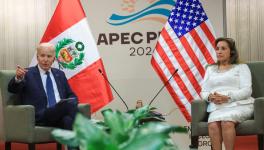Is Classification as ‘Developed Nation’ by US Good News for India? – A Fact-Check
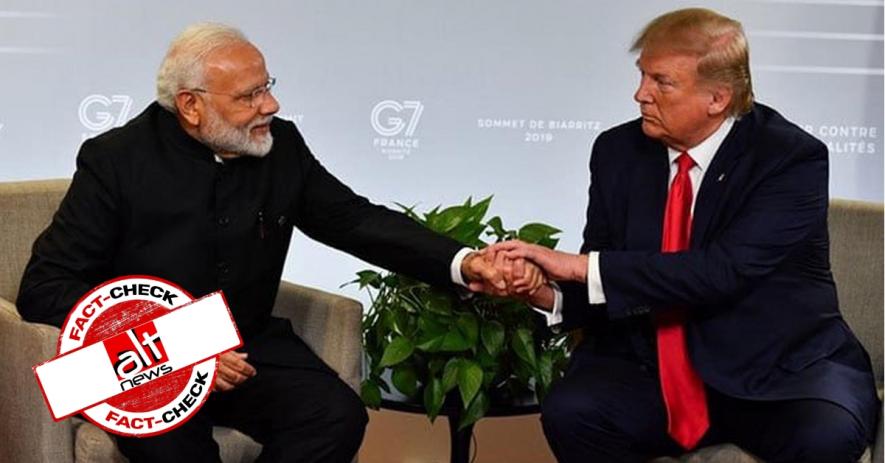
On February 12, National General Secretary of the Bharatiya Janata Party (BJP) Ram Madhav tweeted in celebration – “US classifies India as developed nation” – drawing close to 13,000 likes.
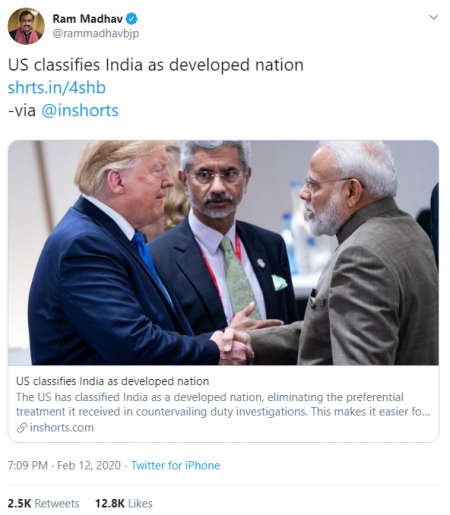
Madhav had shared a link of micro news platform Inshorts, same as Dr Swapneil Mantri who identifies as the state coordinator and social media head, BJP doctor cell Maharashtra. Mantri used the hashtag #PositiveNews.
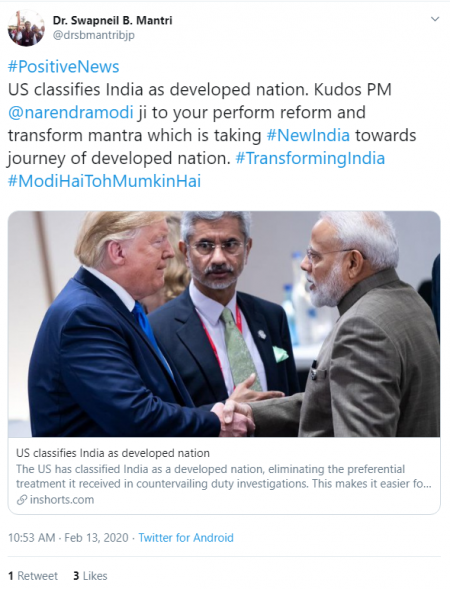
Hold the celebration!
Had the ones who shared the Inshorts link bothered to open it, this is what they’d have read, “The US has classified India as a developed nation, eliminating the preferential treatment it received in countervailing duty investigations. This makes it easier for the US to penalise India if it harms US industries with unfairly subsidised exports.”
The title of the report (or whatever is the acceptable term for 60-word ‘crisp’ news) was undoubtedly misleading, taking away the nuance from news. Inshorts sourced its piece from The Print where the headline doesn’t distort the context of the news. For the sake of brevity, not only did Inshorts remove China’s reference but also the phrase ‘trade benefits’.
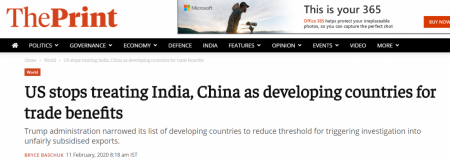
Classification as a ‘developed nation’ by the US is not an indicator of progress
The revocation of India’s developing country status does not mean we have moved up the development ladder but it defines India’s future trade relationship with the US. The reclassification does not indicate a rise in Gross National Income (GNI) or other social development indicators such as healthcare and education.
What does the classification mean?
The United States used to group India in the category of developing nations. However, at the behest of president Donald Trump, the member countries were shuffled. Trump ‘explained’ why in a tweet last year: “…so that countries stop CHEATING the system at the expense of the USA!”
The WTO is BROKEN when the world’s RICHEST countries claim to be developing countries to avoid WTO rules and get special treatment. NO more!!! Today I directed the U.S. Trade Representative to take action so that countries stop CHEATING the system at the expense of the USA!
— Donald J. Trump (@realDonaldTrump) July 26, 2019
Trump wrote that the World Trade Organisation (WTO) is broken thus allowing some of the ‘richest’ countries in the world that claim to be developing nations to get special treatment. India, as per Trump, was one such country.
The WTO allows countries to self-declare as developing nations (or developed/ least-developed countries). India is one of the WTO’s Asian developing members. The self-declaration however can be challenged by member states. The developing country status gives members certain benefits such as the Generalized System of Preferences (GSP) followed by the US. According to the United States Trade Representatives (USTR), “GSP provides opportunities for many of the world’s poorest countries to use trade to grow their economies and climb out of poverty.”
Under the GSP, Indian exporters received tariff-free access to the US until June 2019, when all benefits were suspended. Trump had signed an executive order in November 2018 that ended duty-free status for 50 items. Finance minister Piyush Goyal had sought for complete restoration of GSP benefits. As per Business Standard, “India was the largest beneficiary nation under the GSP, with total benefits from tariff exemptions amounting to $260 million in 2018, according to the data from the USTR’s office.”
India was eligible for the 2% de minimus standard under the WTO rules which required countervailing duty (CVD) investigators to “terminate duty investigation if the amount of subsidy is less than 2% ad valorem (proportion to the estimated value of goods),” according to Bloomberg.
CVDs are trade import duties imposed under the WTO rules to counter the negative impact of subsidies. As duty investigations for India will now be conducted, it would be easier for the US to penalise the country if it harms US industries with ‘unfairly’ subsidised exports.
New Delhi and Washington, DC are reportedly negotiating a trade deal which is likely to be signed during Trump’s visit to India later this month.
The USTR, for the purpose of reclassification, has not considered countries that did not declare themselves as developing nations at the time of accession to the WTO. It has also not taken into account “social development indicators such as infant mortality rates, adult illiteracy rates, and life expectancy at birth, as a basis for changing a designation.”
The US said that the following countries should forgo special treatment:
1. WTO members with a per capita GNI above $12,375 as per World Bank data.
2. WTO members that account for no less than 0.5% of the global trade share.
3. Organization for Economic Co-operation and Development (OECD) membership or application for membership, European Union (EU) membership, and Group of Twenty (G20) membership.
The Trump administration ended the differential treatment for so-called developing nations, including India, giving the following reason: “For purposes of U.S. CVD law, the USTR considers countries with a share of 0.5% or more of world trade to be developed countries. Thus, Brazil, India, Indonesia, Malaysia, Thailand, and Viet Nam are ineligible for the 2% de minimis standard, notwithstanding that, based on the most recent World Bank data, each country has a per capita GNI below $12,375.” The USTR also stated that India’s membership to the G20 bloc makes it ineligible for benefits.
“As of 2017, India’s share in global trade was 2.1% for exports and 2.6% for imports,” reports Business Standard.
In short, the US has revoked India’s developing nation status, notwithstanding that India’s per capita GNI is below $12,375, because the country’s world trade share is more than 0.5% and it is a member of G20 bloc. India is classified as a lower-middle-income economy by the World Bank.
How does the revocation of developing nation status impact India?
The removal of India from the US’s internal list of developing nations can negatively impact Indian trade. In a conversation with Alt News, Dr Biswajit Dhar explained the implications. Dhar is a professor at Centre for Economic Studies and Planning at Jawaharlal Nehru University (JNU). He was formerly the head of Centre for WTO Studies at Indian Institute of Foreign Trade (IIFT).
“This [the classification of India as a developing nation] is important in the larger context of our membership with the WTO. Because unlike in the World Bank which uses income criteria, the WTO follows self-declaration. So as long as India calls itself as a developing country, it is going to be treated as a developing country and as a developing country, there are lots of additional benefits that accrue to a country. For example, they can maintain higher import tariffs. Many developed countries give us the Generalised System of Preferences (GSP) under which the tariffs imposed on us, or other developing countries, are lower than those on developed countries. Last year the US took us off the list which means that our products will attract the same amount of tariffs as other developed countries. Given our problems, market access in the US becomes a little more difficult now. If we are recognised as a developed country, the leeway that we have to use or impose tariffs will lessen in the years to come,” said Dr Dhar.
“India is a unique economy. A part of the country seems like a developed country, but a large part of the nation looks less developed. As a country with one of the largest numbers of poor and undernourished in the world, this part will fall in the category of least developed countries. My view is that there are significant development deficits in India and given those deficits, we need to have flexibility in terms of trade policies,” he furthered.
“At our stage of development, any attack on our status as a developing country will have a serious impact on our development,” said Dr Dhar, elaborating how the reclassification will impact Indian agriculture: “Because of the WTO, we get more subsidies than developed countries, and this includes agricultural subsidies. If tomorrow, we are designated as a developed country, immediately our subsidies will be halved, if not more. So there will be serious implications on farmers. There is some discussion going on that these subsidies should be cut and there should be direct transfer but the ability of the government to give subsidies to farmers will be severely restricted.”
It may be reiterated that the classification of India as a developed nation, from the earlier developing country status, is not a result of achieving a milestone in development. As a matter of fact, the revocation is likely to have a negative effect on Indian trade in terms of subsidies and access to the US market. It is noteworthy that the revocation is not limited to India, but a plethora of other countries.
Get the latest reports & analysis with people's perspective on Protests, movements & deep analytical videos, discussions of the current affairs in your Telegram app. Subscribe to NewsClick's Telegram channel & get Real-Time updates on stories, as they get published on our website.















